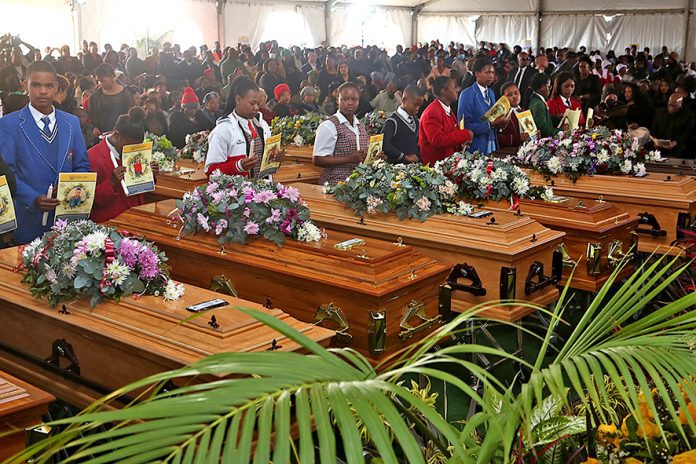Following the Aramoana massacre of November 1990, in which 13 people were killed, the New Zealand government made sweeping and far-reaching changes in its gun laws.
These were further tightened after the 2019 Christchurch Mosque shootings in which 51 people were slaughtered and 40 others wounded. It is much harder to own a gun in New Zealand today.
The ownership of automatic and semi-automatic firearms was banned in the UK after the 1996 school shootings in Dunblane. These two governments took drastic actions to protect their populations against harmful situations.
Some of us are haunted by those grotesque images of rows of coffins of 21 children who died a mysterious death at Enyobeni tavern in East London. What killed the children? What were children as young as 13 doing at a tavern in the small hours of the morning? Why did adults serve children alcohol?
Then the weekend of July 9 saw the massacre of 16 people at a tavern in Soweto; four people were shot dead while two others lost their lives in shootings at taverns in Pietermaritzburg and Katlehong, respectively.
Twenty-two people gone, just like that! Taking the children in Scenery Park into account, we had 43 deaths in taverns in two weeks!
Are we going to see drastic action taken to save lives? Are we just going to see mass funerals, at which politicians promise fire and brimstone, and then nothing, until another macabre incident?
Two factors hit us smack in the face in all these. The first is taverns and our relationship with alcohol. We drink too much. A survey released by the World Health Organisation recently revealed that we imbibe beyond the world average. South Africans consume 9.3 litres of pure alcohol per capita a year, while the world average is 6.3 litres of pure alcohol.
Everywhere you go in South Africa, even the smallest village, you are greeted by alcohol advertisements or drinking holes, and young people drinking in the streets.
It seems liquor licences are dished our right, left and centre. Many probably do not even bother applying for licences because there are no consequences for trading illegally.
When are we going to recalibrate our relationship with alcohol? Some of us used to complain about the previous regime not caring about black lives. Does the present government care?
The second is the proliferation of guns in our society. South Africa is awash with guns, both legal and illegal. These firearms feature in crimes such as murder, robberies, cash-in-transit heists and car hijackings.
The startling thing is that the army and the police combined are out-gunned by the total number of firearms in the hands of private security companies and those legally and illegally owned by civilians.
Each day, firearms are lost by or stolen from the army, police or civilians to feed the illegal gun ownership, estimated at a staggering 500 000 to 4-million.
If you add lawlessness and nonexistent crime intelligence to this mixture, you get a pretty scary picture.
Will we ever get a decisive government that will drastically reduce or get rid of guns in civilian hands and control the ubiquity of alcohol in our society? How about the banning of liquor advertisements, as we did with tobacco?
- Mangena is former minister of science and technology
Follow @SundayWorldZA on Twitter and @sundayworldza on Instagram, or like our Facebook Page, Sunday World, by clicking here for the latest breaking news in South Africa. To Subscribe to Sunday World, click here.



